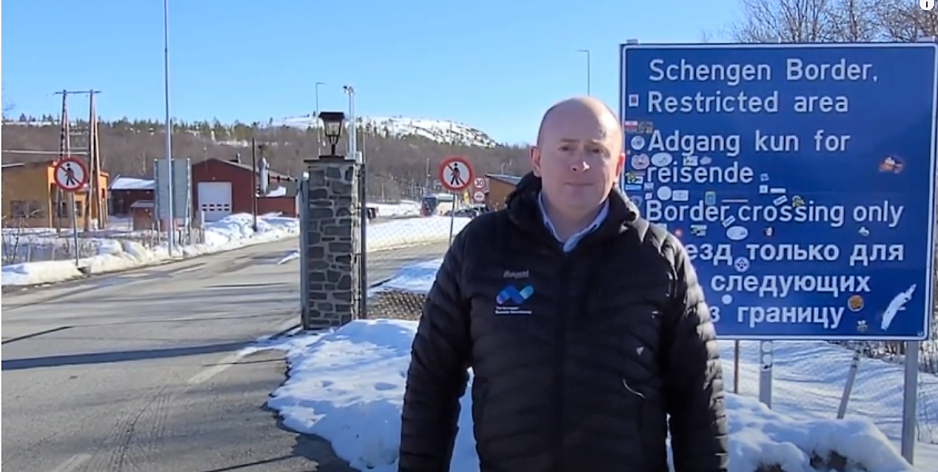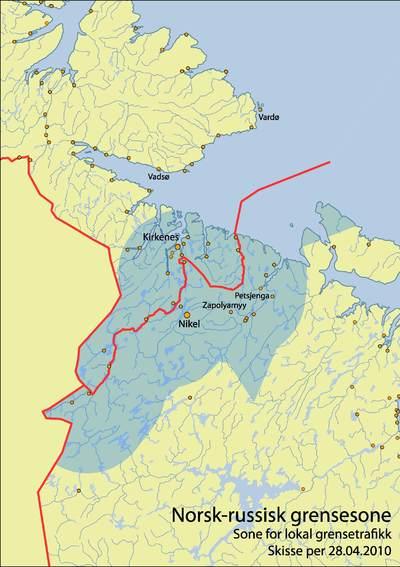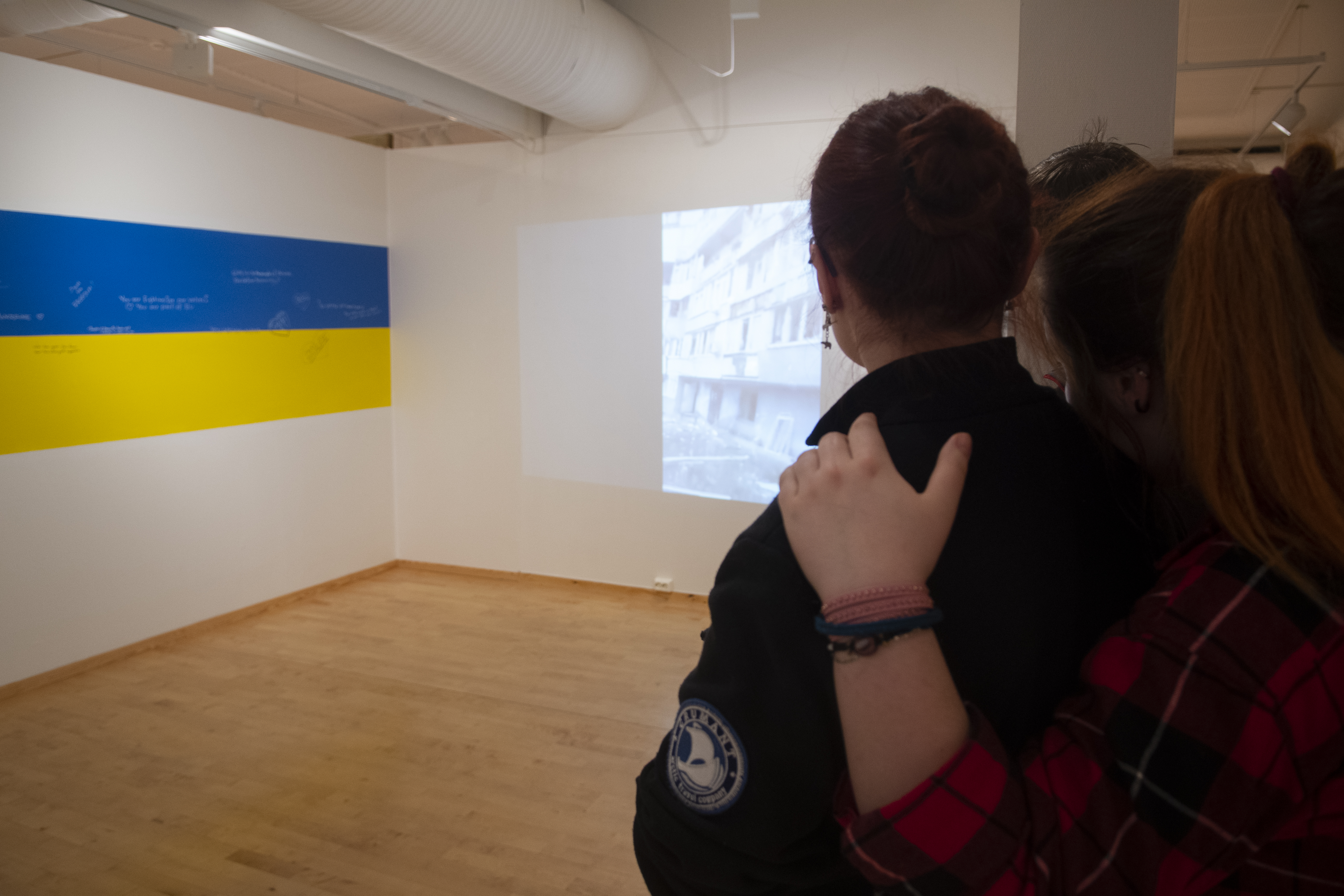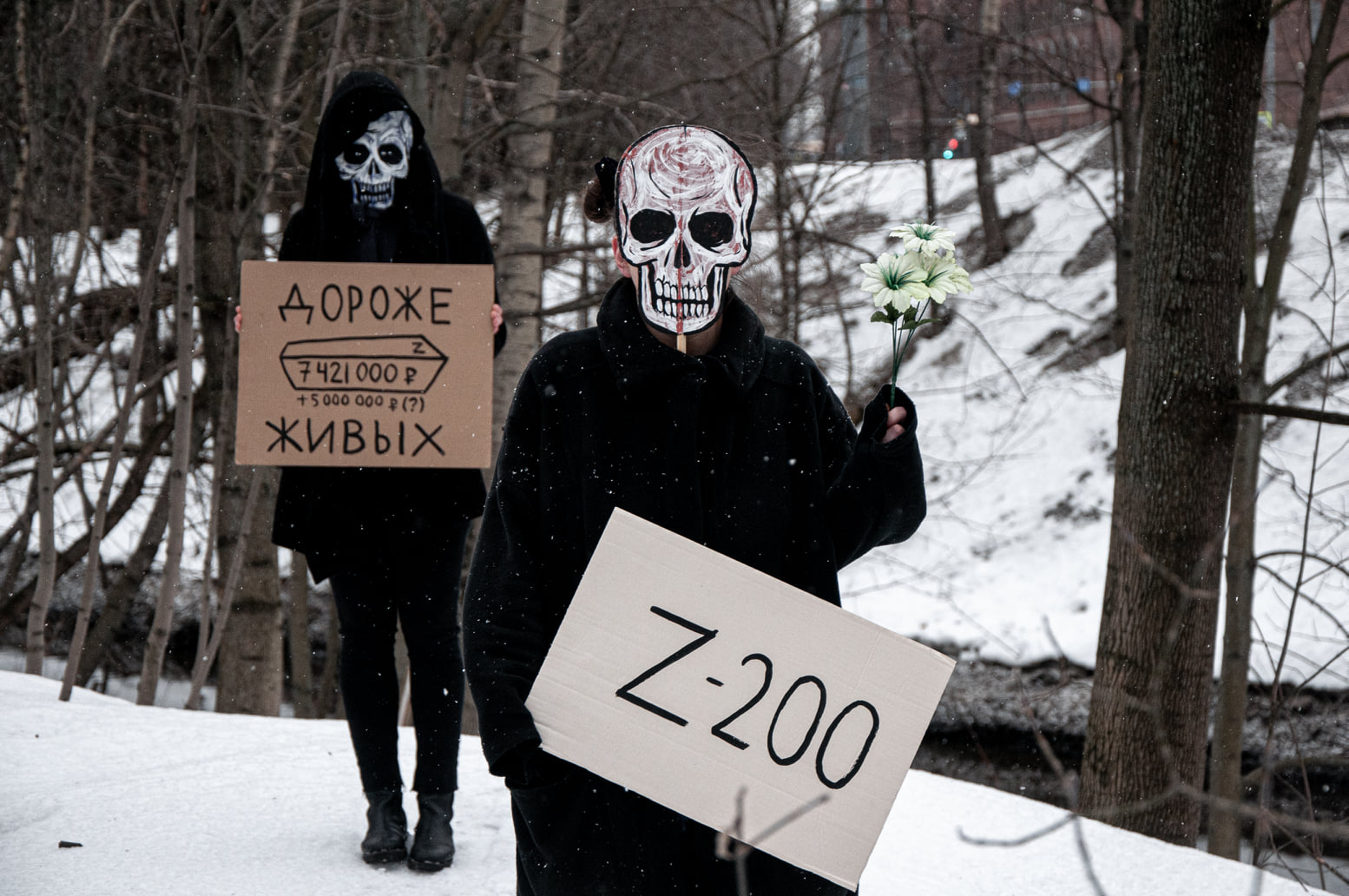10th Anniversary for the Border Resident Certificate: There is Nothing to Celebrate
This year marks the 10th anniversary of the Norwegian-Russian Border Resident Certificate. 2022 was also to be the year in which the friendship towns of Kirkenes, Norway and Pechenga, Russia were to celebrate their 50th anniversary. Now, no-one knows whether the relationship between the Norwegian and the Russian people will survive the war. “There is nothing to celebrate”, says General Manager Lars Georg Fordal of the Barents Secretariat.
At the time of writing, no-one yet knows whether the relationship between the border residents, who are already marked by two years of pandemic, will survive the Russian invasion of Ukraine.
The border has been closed from the Russian side since 2020 due to the pandemic and through that, the Border Resident Certificate has indefinitely suspended. Applications for such certificates have also been put on hold until further notice.
Visa-free border
In 2010, Norwegian and Russian authorities agreed on a Border Resident Certificate scheme for residents in the border zone between Norway and Russia.
Then-Foreign Minister Jonas Gahr Støre (Labor) of Norway first aired the idea of a special scheme for border residents in a meeting with then-Governor Yuri Yevdokimov during a visit tot Murmansk, Russia in January 2018.
Later, both Støre and the Russian Foreign Minister Sergey Lavrov have repeatedly pointed to the Border Resident Certificate (BRC) as a first yet important step towards a visa-free border.
The agreement was signed by Støre and Lavrov.
From May 2012, inhabitants on both the Russian and the Norwegian side of the border of the joint border could apply for a BRC provided they live no longer than 30 kilometers from the border.
We have been put back in time
Border Resident Certificate
- You can visit the border area as often as you want for up to 15 days in a row.
- The BRC is valid for three years. After that, one must apply for renewal.
- All border crossings must take place at the Borisoglebsk – Storskog border crossing
The guidelines for the BRC are the same for Norwegians and Russians alike. The difference lies in the fact that Norwegians have to apply for a border resident certificate from the Russian Consulate-General in Kirkenes (Norway), whereas Russians apply to the Norwegian Consulate-General in Murmansk (Russia).
Russians are awarded a Border Resident Certificate in the form of a plastic card resembling a bank card. Norwegians will have their BRC glued into their passports, just like regular visas for Russia are attached to their passports.
Russian individuals who for the past three years have been a resident of the municipalities of Nikel, Pechenga, Zapolyarny or Korsunovo and within a zone of 30 kilometers from the Norwegian-Russian border may have the right to be granted a Border Resident Certificate (BRC). They need not be Russian citizens.
In Norway, border residents are defined as living in Sør-Varanger municipality, which lies within a zone of 30 kilometers from the Norwegian-Russian border.
The scheme includes some 9,000 people in Sør-Varanger and up to 45,000 persons on the Russian side of the border.
Better days
Then-Foreign Minister Jonas Gahr Støre (Labor) shows a map over the areas covered by the Border Resident Certificate scheme with Russian Foreign Minister Sergey Lavrov by his side. (Archive photo: Kjetil Elsebutangen, Norwegian MFA)
These are people who are already have close ties, established through history.
Until the marking of the border between Russia and Norway in 1826, Sør-Varanger was part of a larger joint area consisting of Neiden and Pasvik in Norway, as well as Pechenga in Russia.
The negotiations about where the border should be drawn were rather peaceful, however, in 1920, the Petsamo area on the Russian side of the border was transferred to Finland. Norway no longer had a border to the Soviet Union. However, in the armistice agreement of 19 September 1944 following the Finnish continuation war, Finland had to return the Petsamo are to the Soviet Union, and the old 1826 border once again became the border between Norway and Russia.
Today, the border remains firm. But the peoples of the North have always been borderless and the Barents region is still multicultural and characterized by its history. Different Sami groups, as well as Finnish, Kven, Russian and Norwegian inhabitants live side by side and receive visitors from large parts of the world.
The various cultures are interwoven both in everyday life as well as at special events, and there are a series of cross-border festivals in the Barents region.
Barents Spektakel 2022
A few days prior to Russia’s invading Ukraine, the Barents region celebrated life at the opening of the cross-border festival Barents Spektakel in Kirkenes, Norway. At the end of the festival, the war was a fact. (Photo: Ksenia Novikova, the Barents Secretariat)
Popular scheme
Since the bilateral agreement on visa-free border crossing between Russia and Norway entered into force in 2012, the Russian Consulate-General in Kirkenes has issued more than 8,000 permissions for local border traffic, i.e. Border Resident Certificates.
According to the Russian Consulate-General in Kirkenes, this is the total number of documents issued, not persons. One person may have had several BRC’s in these ten years, the Consulate says in an email to High North News.
“According to our information, the Norwegian Consulate-General in Murmans issued more then 5,000 documents”, Attaché Anastasia Ruzaeva at the Consulate writes.
They estimate that some 4,000 residents on the Norwegian side of the border are current holders of a BRC.
It is currently hard to predict whether the BRC scheme will survive its first decade. The damage done by the Russian invasion in Ukraine is significant.
However, there is hope that things will turn out as they did after the end of the Cold War in 1989, when the normalization between neighborly people did not take long. People traveled across borders, families sought their relatives, and trade soon commenced.
General Manager of the Barents Secretariat Lars Georg Fordal and Norwegian Foreign Minister Anniken Huitfeldt (Labor) meton thee first day of the Kirkenes Conference 2022. On that same night, there was a small event to mark the anniversary of the Border Resident Certificate. (Photo: Ksenia Novikova, the Barents Secretariat)
Put back in time
General Manager of the Barents Secretariat Lars Georg Fordal is someone who is very familiar with this history. Before moving to Kirkenes, hew as an international observer for OSCE, the Organization for Security and Cooperation in Europe, in Ukraine. He was also instrumental in the work to develop the BRC, as he was Project Manager for its introduction.
He does not believe that the war will mean an end to border cooperation between the people of the North, however, he dares not say for sure. The waters are too unchartered for that.
“We are entering an era in which there is a lot we don’t know. We have been put back in time”, Fordal says.
He is not only talking about the past decade with the BRC, but also about the days before – the 30 good years of cooperation with Russia.
“Now it is our anniversary, yet Russia has invaded a neighboring country. That affects all those who work with cross-border cooperation”, Fordal says.
Affects business
Today, the border is practically closed due to the pandemic. And Fordal reports that there is little cross-border traffic at Storskog, the Norwegian side of the border crossing point.
“One may apply for exemptions”, he says.
Yet everyday cross-border traffic is missing, from both sides of the border. That has consequences for local businesses that rely on customers from exactly Norway and Russia.

On a normal day, some 1,000 people cross the Norwegian-Russian border. During the pandemic, that number was reduced by 95 percent, Lars Georg Fordal explained during the High North Tour 2021. The border is currently closed for the third year running, and the BRC’s are thus suspended until further notice. (Photo: Arne O. Holm)
“The bakery in Nikel, for instance, which the owners refurbished and prepared to receive customers again after the pandemic. There are also restaurants, dentists and workshops used by people from Kirkenes. Business in Kirkenes also suffers from having fewer customers”, Fordal says.
Businesses in Kirkenes, Norway are scaled for 30,000 inhabitants. Those who actually live there count some 3,500 people.
Distancing themselves
Do you believe the relationship will be the same again after the war?
“Yes, I think so, however, we do not know how this will end. That will depend on what one thinks about the neighboring country afterwards. At present, many in Kirkenes distance themselves from Russia because the invasion is so unacceptable”, Lars Fordal says.
He has the impression that many feel this, that there is some kind of border that has been crossed. He is not certain whether the somewhat cooled relationship between people in the North will lead to a lasting change.
“However, we are neighbors and we need to have a constructive relationship”, Fordal says.
There are, in any case, no indications that the BRC scheme will come to a halt.
“Nevertheless, our observing its 10th anniversary this year is quite special, and it is also the anniversary of Sør-Varanger’s friendship municipality Pechenga. It has a bitter aftertaste. There is nothing to celebrate.”
Sør-Varanger Mayor Lena Norum Bergeng (Labor) gave an emotional speech at the Kirkenes Conference 2022 on that fatal Thursday when the war broke out in Ukraine. (Photo: Hogne Bø Pettersen, the High North Center)
Will take time
That is confirmed by Sør-Varanger Mayor Lena Norum Bergeng (Labor).
“Sadly, there will be no marking of the 10-year anniversary. We have no contact with any authority level on the Russian side”, Bergeng says to High North News.
The until recently good neighborly relationship between Norway and Russia has existed exactly because the Border Resident Certificate facilitated this.
Bergeng hopes that dialogue will be resumed between Norwegian and Russian people.
“I hope for new cooperation and continuation of the BRC. And I would like to expand the scheme so that more people than only those living in the border areas may make use of it”, Bergen says.
“However, we fear that re-establishing the relationship will take time and we do not know what will happen next. I am afraid much of it has been taken far back in time again”, the Mayor says.
The BRC has been an unconditional success
Will make it
The Mayor says that although they condemn thew war, they do not condemn the people.
“The people I have spoken with want cooperation to resume. The border has already been closed for two years due to the pandemic and the local businesses in Kirkenes have gone through challenging times. Yet during the pandemic, at least we were home shopping locally”, Bergeng says.
Now that Norway is open to the world again, people travel abroad and spend their money elsewhere.
Yet the people of East Finnmark have braced winter storms before and survived, and the mayor believes they will do just that once again.
“These are hard times, however, we have gone through societal transitions before and we will manage to do so again.”
“The Border Resident Certificate has meant that we have been able to have relations with neighbors that we did not have before. Since its introduction, traveling to Nikel has been as natural for us as it has been for people in Halden [southeastern Norway] to go to Sweden. It has been an unconditional success”, Bergeng says in an attempt to explain the relationship with the neighbor to the East to those living further south in the country.
“It is challenging to communicate why we have the special relationship with Russia that we do to those who do not share this proximity”, the Mayor of Sør-Varanger says in closing.
This article was originally published in Norwegian and has been translated by HNN's Elisabeth Bergquist.




